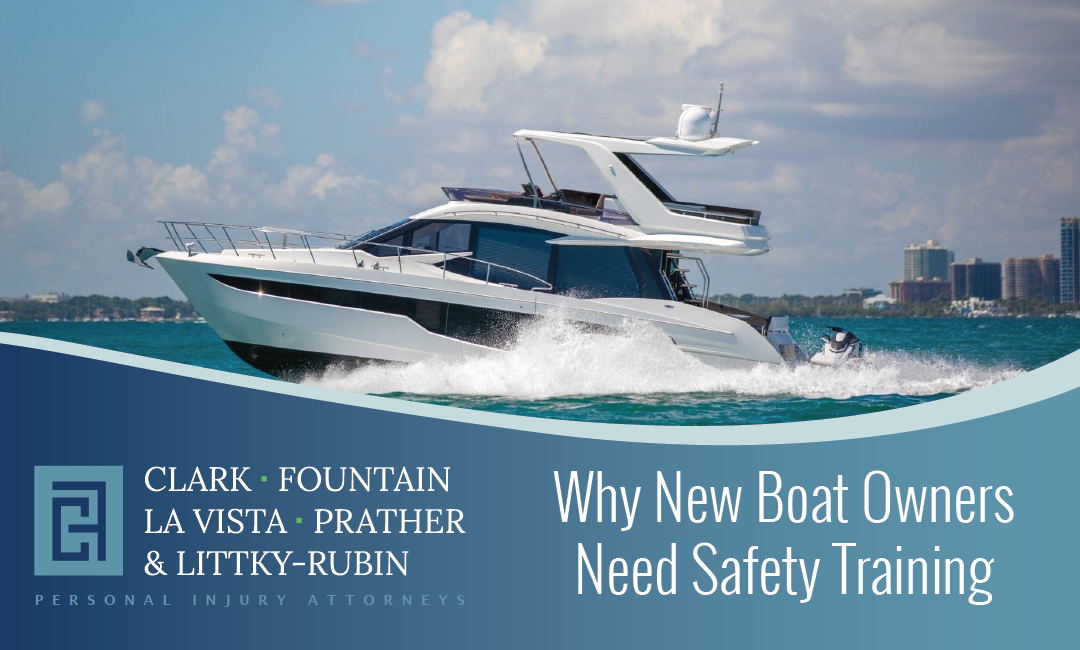Why New Boat Owners Need Safety Training…

As the global pandemic progressed, forcing everyone into social distancing, people perceived outdoor activity to be safer, and the country began pursuing their passion for boating, fishing, and watersports. As a result, the boating industry experienced a “Recreational Boom” for the first time in 13 years.
According to the National Marine Manufacturers Association, more than 310,000 new powerboats were sold in 2020, levels the recreational boating industry had not seen since before the Great Recession in 2008.
How the Spike in Boat Sales Contributed to the Increase of Boat Accidents
In 2020, the Boating Safety Division of the U.S. Coast Guard reported over 5,265 recreational boating accidents. The accidents resulted in 3,191 injured victims and 767 fatalities, an alarming increase of 26.3% in boat-related incidents and 24.7% in injured victims compared to the previous year. Sadly, a high percentage of accidents were a result of boaters’ operations including excessive speed, lack of experience and attention by the boat operator, and alcohol use. The second highest cause of accidents stems from mechanical failure, with the primary factors being engine failure, electrical system failure, and hull failure.
In Florida, the Florida Fish and Wildlife Conservation (FFWC) reported more than 830 boat incidents resulting in 534 victims injured and 79 victims tragically killed. Surprisingly, the leading cause of accidents involved boats colliding with another vessel or fixed object, towing-related water sports activities (wakeboarding, water skiing, and wake surfing), and accidents involving self-powered watercrafts (canoes, kayaks, and paddle boards).
Most Common Mistakes New Boat Owners and Operators Make
Owning or operating a boat comes with a great deal of responsibility. For new boat owners, here’s a list of the Most Common Mistakes New Boaters and Operators Make:
Overloading the Boat: this miscalculation is extremely dangerous and may cause boat swamping or cause the boat to capsize. If this occurs, passengers may be washed into the water and exposed to an unguarded propeller or passing boats.
Running Aground: this happens when the boat’s operator or captain fails to stop the boat in time and causes the hull of the boat to hit the bottom of the waterway. When this occurs suddenly, passengers may be ejected from the boat.
Hitting the Dock or Submerged Object: more dangerous than running aground, hitting a dock or a submerged object like a rock is very common for new boaters and operators. If a boat collides with either object suddenly, passengers may be ejected or may be thrown around during the collision.
Improper Anchoring: can occur in many forms such as 1.) when a boat owner fails to use an anchor fit for the size and type of boat causing the boat to float away or become entangled 2.) when an operator or owner fails to use enough anchors to secure the boat causing the boat to drift, move around during high winds, or swing around colliding with fixed objects or other boats 3.) failing to retrieve an anchor or using the engine to jerk or free the anchor. This mistake can be devastating to anyone in the path of the anchor line
Failing to Maintain or Repair: when a boat owner, captain, or rental company fails to maintain or repair their boats resulting in a gas or fuel leak, boat fire, or explosion.
Prevent Boat Accidents by Learning the Ropes in Florida
The good news is that these mistakes and potential accidents can be prevented by taking the required safety courses, learning the proper boating techniques, and practicing with an experienced instructor.
Boat Safety Education Course
This introduction course covers Pre-Launch Preparation, Docking, and Close-Quarters Maneuvering, Piloting & Navigation, International and Inland Navigation Rules, Boat Control in the Open Water, Anchoring, Emergency Procedures, and How to Secure Your Boat.
Night Operations Endorsement
This intermediate course covers identifying night hazards, operating navigational lights, preparing a float plan, performing simulated water rescue, and how to enter and leave a harbor at night. This course is recommended for owners of vessels 34 feet or larger.
Once you’ve completed the boat safety course and the night operations endorsement, you may apply for a Boat Safety Education ID. We also urge new boaters to practice with an experienced boater or instructor before inviting guests on board.
Boat Defects More Common Than Not
An often overlooked and little understood aspect of boating accidents is the existence of defects in the boat’s hull or its mechanical operating systems. Unlike motor vehicles, aircrafts, and other forms of transportation, boats and watercraft are not subject to stringent government oversight and performance standards.
As a result, many boat manufacturers perform either no or very limited real world testing. In many of the cases that our firm has investigated, it has become apparent that if boat manufacturers actually tested their products in a manner in which they knew and understood that the public would use them that many design defects could have been corrected before the boats were offered for sale in the marketplace.
Design defects involving hull design, operational freeboard, operator sight distances, control locations, lighting, unguarded propellers, and other defects have all been shown to contribute to boating accidents.
Injured in a Boat Accident? Call Clark Fountain Today
At Clark Fountain, our legal team has represented victims injured in every type of boat and watercraft accident imaginable. We have obtained significant verdicts and settlements against negligent parties including boat owners, boat captains, boat repair and maintenance companies, and boat manufacturers. If you or someone you love was injured in a boat accident, we urge you to contact our personal injury attorneys for a free consultation.
